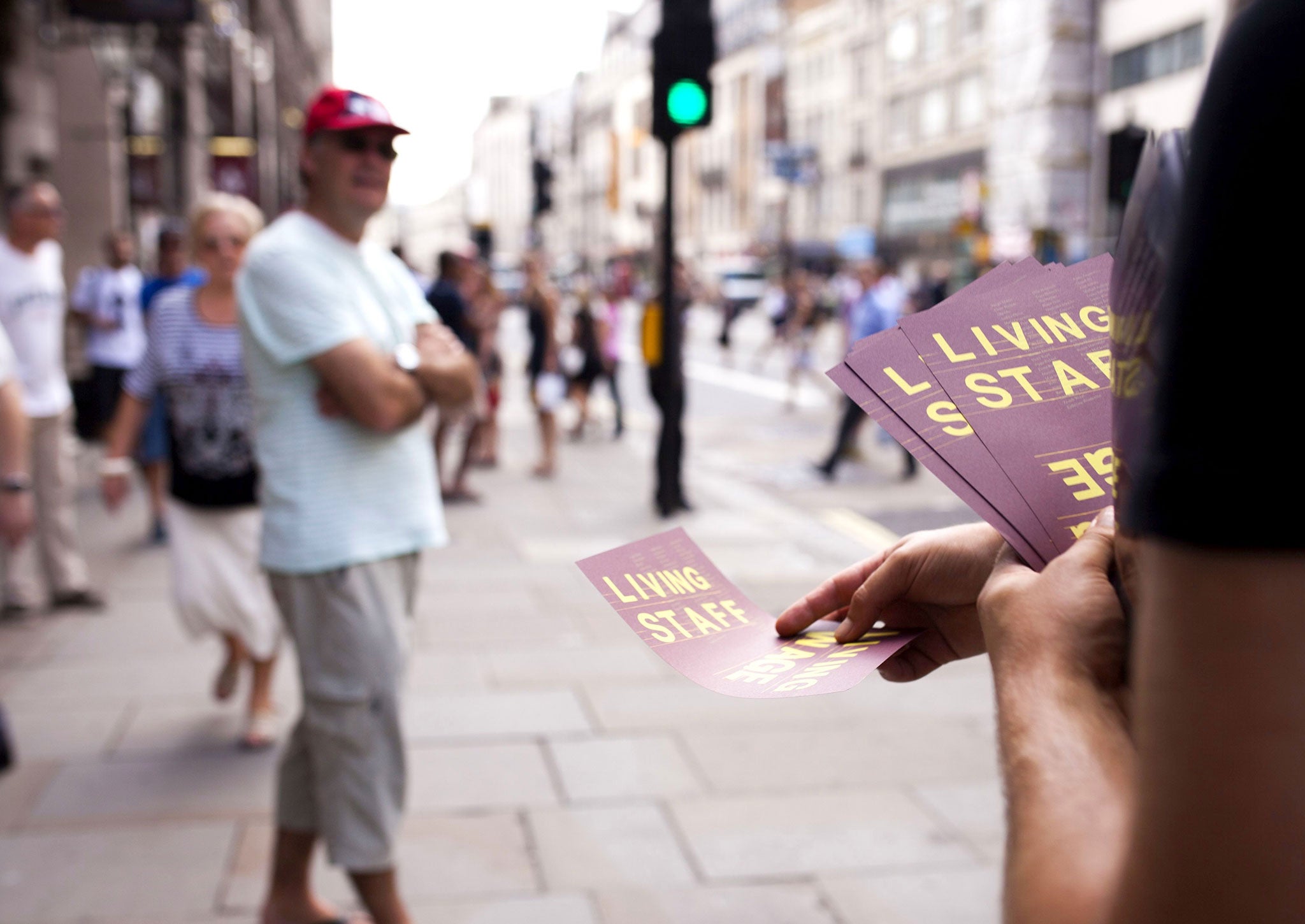The Living Wage is a good start, but it isn't as generous as you might think
Compared to our grotesquely low minimum wage it looks great, but look closer and it doesn't quite add up

Your support helps us to tell the story
From reproductive rights to climate change to Big Tech, The Independent is on the ground when the story is developing. Whether it's investigating the financials of Elon Musk's pro-Trump PAC or producing our latest documentary, 'The A Word', which shines a light on the American women fighting for reproductive rights, we know how important it is to parse out the facts from the messaging.
At such a critical moment in US history, we need reporters on the ground. Your donation allows us to keep sending journalists to speak to both sides of the story.
The Independent is trusted by Americans across the entire political spectrum. And unlike many other quality news outlets, we choose not to lock Americans out of our reporting and analysis with paywalls. We believe quality journalism should be available to everyone, paid for by those who can afford it.
Your support makes all the difference.The Living Wage Foundation have made remarkable progress over the last 15 years, but is it all it's cracked up to be? As it's currently Living Wage Week, it might seem churlish to carp at the detail, but it's a discussion we can't afford to avoid.
At £7.85 outside London, the newly updated living wage is 20 per cent higher than our current minimum wage, while the London rate of £9.15 is 41 per cent higher. At a time when average real wages in the economy continue to fall, the living wage movement is a lone bright light in the generally gloomy outlook for low-wage employees.
However, those headline figures are not all that they seem. The report which set the living wage outside of London says that a wage reflecting “actual minimum living costs” would be £9.20, (up from last year's £9.08). The calculation, however, requires a cap of 2 per cent above average pay rises. According to the report, this is because there are “limits to how far it is acceptable for employers to increase wages for the lowest earners to meet their increased needs.”
It turns out that the Living Wage is not a living wage - not outside London, at least - and has not been so for several years. In order to become so it would need to rise by another 17 per cent. It has been kept down because, according to the report, it might not be acceptable for employers to increase the wages of the lowest paid disproportionately. To put that another way: people living on the bread line shouldn't receive a living wage in case anyone earning more feels hard done by when they don't also receive a raise.
It is only because the national minimum wage is so grotesquely low that the Living Wage can be seen as generous. That “minimum acceptable standard of living” is still rock bottom, and even so it depends upon some critical assumptions. Not least of these is that everyone works full time. In an age of zero hours contracts, this is optimistic. It also assumes that people with children have access to social housing (at social rents), which many do not.
Explore the underlying data and other issues arise. The Minimum Income Standard upon which the Living Wage outside London is based relies upon prices at large chain stores and supermarkets, few - if any - of whom pay the Living Wage to all of their staff. Life on the Living Wage, therefore, is dependent upon retail, transport and processing activity, much of which may well be paid below that rate. And this, of course, is before the pay and conditions of workers in low wage producer countries is considered. People on the Living Wage are not expected to pay a premium to ensure that the goods that they buy are made by workers who are not exploited.
As a director of a company that pays the Living Wage, I find this all sobering. The idea that an employer should take credit for paying the minimum that people need to live on is itself questionable. Any minimum should be a starting point, rather than a target, but employers have been encouraged to treat the Living Wage as something to aim for, and to congratulate themselves when they achieve it. To discover that this “ethical” pay rate is actually much less than people need to live on calls into question the living wage approach.
If, as seems probable, the Living Wage with its 2 per cent cap cannot now catch up with its true level, the Living Wage Foundation may have to rethink its strategy. Everybody needs the means to live, and paid work for all might not be the best way of achieving this. Is it time, perhaps, to think seriously about the Basic Income, and the autonomy it gives people over the use of their time to produce wealth in the most socially productive way?
Martin Whitlock's book, Human Politics : Human Value was published last month. (www.mindhenge.co.uk)
Join our commenting forum
Join thought-provoking conversations, follow other Independent readers and see their replies
Comments